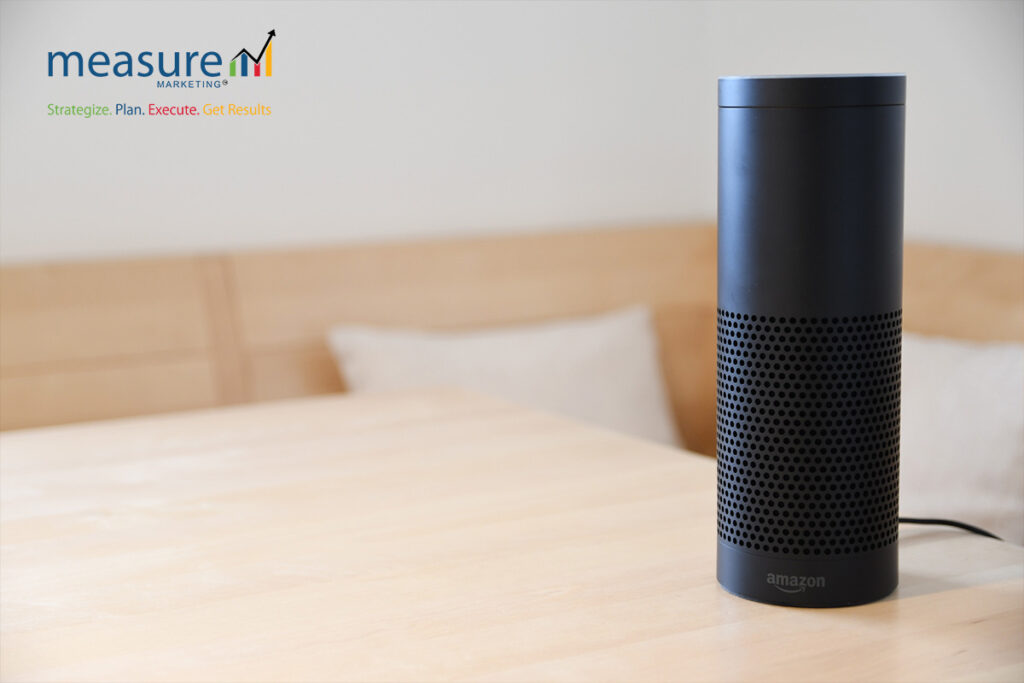What’s the next wave in SEO? Who’s the next influencer? Would you be surprised if I told she lived in a black and blue lighted tube? (And everywhere else, frankly).
Alexa and her cohort are going to cause a pretty big change to SEO practices in the upcoming year.
At the end of 2018, about 52 million Google Home devices were purchased. Thanks to the popularity and increased sophistication of these kinds of devices, ComScore says that 2020 is going to be the year that half of all searches will be done not by text, but by voice. In the next year, a third of all website sessions will be voice-led.

What Does it Mean?
Your SEO will require differing styles of keywords when you’re aiming for an audience that’s chatting with Alexa. Longtail is going to get even more important, because people don’t ask questions using just a few words. When we talk, we naturally use more words.
It’s going to be essential to cut out technical jargon whenever possible. We simply don’t use that type of language in our day-to-day conversations. People want to know, “Alexa, where can I buy the best croissants in town?” or they’ll say, “Alexa, show bike shops near me.”
Those two little words will be your best friend in voice searches. Fifty-eight percent of users utilize voice search to find local businesses. Plus, people don’t just use voice searches to find what they want; they use them to tell them where to go when they don’t know exactly what it is they want. They almost always want what’s “near me.”
Tapping into that is simple enough. Just ask yourself, what’s the scope of your business? Do you want to be recognized in your neighborhood? City? Country?
Wherever you need to be known, it had better be located somewhere on your page. Want to be the best noodle place in Vancouver? Make sure you mention “Vancouver” on your page in multiple areas.
This will be a great way to get yourself to what is now being called “position zero,” due to the importance of the second and third positions being nonexistent when searching via voice commands.
A voice search won’t be presenting you with a list of options. You’ll simply ask a question and get an answer. If you want to be relevant to voice searches, you must be the answer to that question. If you’re that answer, you’re position zero.

Understanding User Intent and the Featured Snippet
People aren’t just using Alexa to get what they want; they’re asking her questions about what they’re curious about. These questions are a great way to grab Google’s attention and get you to position zero. If you’re a chocolate shop, consider what search queries may get someone to your shop window. Then take these questions and use them on your page. If you can imagine your customer asking , “why do they put sea salt in caramel?” maybe put a section on your website where you say, “why do we put sea salt on our caramel?” and then answer that question. You must think like the customer, you must search like the customer.
It may be helpful to read up on Google’s Hummingbird and BERT updates and how they works to master this aspect of the voice search. Key phrases that will help in figuring out intent including the previously discussed “near me” as well as “to buy” and “can I buy?” Knowing how to take advantage of this will help you get a coveted featured snippet. Same with using natural, conversational language.
With the rise of voice searches, now more than ever a featured snippet is your key to reaching more customers. Often that snippet will be what a user’s home assistant will read back to them after conducting a search. Predicting intent, providing accurate, casual-sounding information, and using conversational longtail keywords will help you get that snippet.
Only Fast, Neatly Coded Pages Get Snippets
As always, page speed is key to your SEO, but for voice searches it’s even more important, specifically for your mobile page, to load as quickly as possible.
Along with page speed, another great way to get that snippet is to add structured data to your page. This is essentially just code that you add to the HTML of your page to make it easier for Google to understand what’s going on. For instance, a recipe might have the time it takes to bake and its calorie count in its structured data. To find what terms and keywords you need in your structured data, a site like schema.org may be useful.
One final way to get after position zero is to check your Google My Business page. If any information is missing here, you might lose that coveted position zero. Make sure that you have your brand name, hours of operation, address, phone number, etc. accurate and up to date on here.
SEO as we once knew it is gearing up for big change thanks to our friend Alexa. Conversational, longtail keywords are going to take precedence along with your location as a keyword to grab the attention of those searching what’s “near me.” Anticipating user intent and user speech patterns will be essential. If you talk like your user on your page, you’ll get closer to position zero.